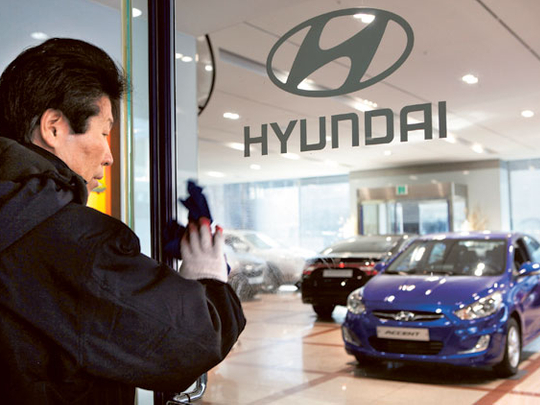
Seoul : Hyundai Motor Co., South Korea’s largest carmaker, will start providing auto loans this month to buyers in China as it seeks to increase the share of sales in the world’s largest vehicle market.
Hyundai’s auto-financing venture aims to get as many as 45 per cent of customers who buy Hyundai and affiliate Kia Motors Corp. cars on loan in three years, Lee Kyo Chang, chief executive officer of Beijing Hyundai Auto Finance Ltd., said in a phone interview on Monday. It expects to match the 30 per cent annual growth in terms of volume coverage achieved by the auto- financing industry, he said.
The automaker, based in Seoul, joins General Motors Co. and Volkswagen AG in setting up an auto-financing business in China, as an increasing number of the nation’s younger population embrace the idea of buying cars with borrowed money. Sales of cars trailed analyst estimates for a second month in August as consumers held off purchases in anticipation of more discounts amid a slowing economy.
“Hyundai will be able to expand client base and it can attract more buyers with loans for more expensive high-end models,” said Yim Eun Young, an auto-industry analyst at Dongbu Securities Co. in Seoul. “It can help Hyundai, Kia to maintain competitive edge against China’s local makers.”
Hyundai Motor gained 0.4 per cent to 246,000 won at 11:28 a.m. in Seoul trading, while Kia dropped 1 percent. The benchmark Kospi index declined 0.3 per cent.
Financing cars
About 10 per cent of vehicle purchases made last year in China were on loans, a ratio that China Minzu Securities Co. estimates will triple by 2017 as more of the nation’s youth buy their first cars.
The Hyundai financing arm will provide loans to retail buyers and dealers across China, Lee said. The company will first rely on bank loans for funding and later consider selling bonds and asset-backed securities when the venture meets local regulations to sell such notes, he added.
“We’ll focus on risk management and stabilization of operation for the first several years,” Lee said by phone from Beijing. “We’re confident we can provide competitive services after stacking up experience.”
Hyundai has forecast to sell 2 million Hyundai and Kia cars annually in 2016 in China, Lee said.
The carmaker opened its third Chinese factory in June and aims to increase wholesale shipments in the market 6.8 percent to 790,000 units this year from 2011, according to a company presentation in January. Kia Motors targets to boost sales 6.4 percent to 460,000 units this year, it said in January.
Slower expansion
Wholesale deliveries, including multipurpose and sport utility vehicles, gained 11 per cent to 1.22 million units in August, the China Association of Automobile Manufacturers said on September 10. That compares with the 1.24 million average of 14 analysts surveyed by Bloomberg.
Economic growth in China moderated in the second quarter to the slowest pace in three years.
Beijing Hyundai Auto Finance, Hyundai’s second overseas car-financing venture, has an equity capital of 500 million yuan ($79 million) and this can be expanded depending on growth in the business, Lee said.
The investment unit of Beijing Automotive Industry Holding Co., Hyundai Motor’s Chinese car-making partner, owns 40 percent of the company, with the rest held by Hyundai Motor and its consumer finance unit Hyundai Capital Services Inc.
Auto financing companies provided about 200 billion yuan of loans last year, according to carmaker Guangzhou Automobile Group Co. The China Association of Automobile Manufacturers estimates the market for vehicle loans will expand to 525 billion yuan by 2025.
GM’s local auto-financing venture GMAC-SAIC Automotive Finance Co. in 2004 began providing loans for Buick, Chevrolet and Cadillac cars. Volkswagen, the second-biggest foreign carmaker in China after GM, plans to spend 2 billion yuan to expand auto-financing in China this year, Cai Xue, a VW spokeswoman, said in July.
Non-performing auto loans surged in the 1990s, owing to a lack of risk controls such as credit scoring. That led the central bank to suspend new auto loans from 1996 to 1998, according to He Liming, head of the China Automobile Dealers Association.
“We plan to keep bad-loan ratio at industry’s average of 0.3 per cent to 0.5 per cent from 2016 although the rate may be a bit higher in the beginning phase,” said Lee. “We feel a bit fortunate we’re market follower and not the leaders as the early birds had tough time at the beginning due to the absence of a credit bureau.”












